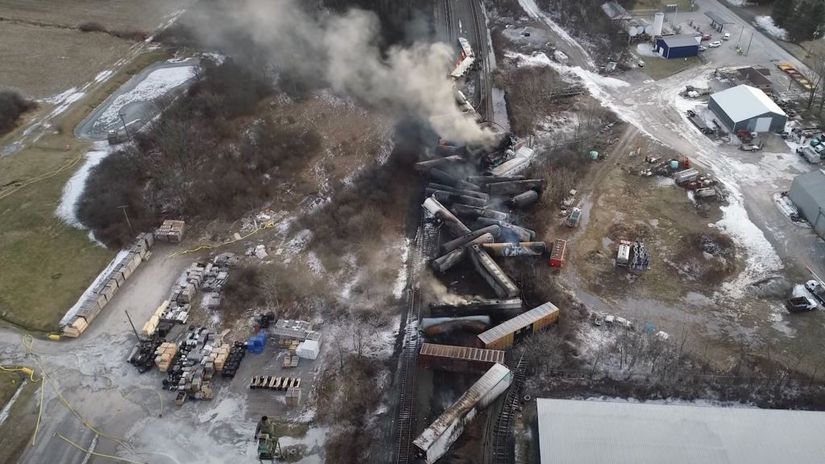It should be no surprise that corporate greed is making life dangerous for ever greater numbers of people.
ROBERT REICH for Robertreich.Substack.Com
I’m not surprised that migrant children who have been coming into the United States from Latin America without their parents, fleeing violence and poverty, have ended up in some of the most punishing jobs in the country.
And I’m not surprised that a train carrying dangerous chemicals
derailed, causing a toxic plume that is sickening people in Ohio.
By Drew Sheneman
In fact, I’m not surprised that corporate greed is making life
dangerous for ever greater numbers of people.
I saw it when I was secretary of labor in the early 1990s,
overseeing enforcing the nation’s labor laws.
The department had only 1,100 inspectors responsible for the health and safety of 130 million workers, including any children who might be working illegally in dangerous conditions. And not even the biggest penalty we could impose was high enough to deter companies that treated such fines as costs of doing business.
The Labor Department is still woefully understaffed, and
penalties are still too low. Every time the department’s budget is up for
review, members of Congress — mostly (but not entirely) Republicans — refuse to
appropriate enough funds for inspectors or to increase penalties.
So of course migrant children coming into the United States,
fleeing violence and poverty, have ended up in dangerous jobs.
In Delaware, Mississippi, and North Carolina, young children are working in slaughterhouses. In Michigan, young children are making auto parts used by Ford and General Motors.
In Virginia, girls as young as 13 are washing
hotel sheets. In Florida and Tennessee, 12-year-olds are doing roofing jobs. In
South Dakota, children are sawing planks of wood on overnight shifts.
It’s a throwback to the late 19th century, when children were
drafted into dangerous work.
On Monday, the Department of Labor announced new steps to stop
exploitative child labor. Biden officials say they’ll ask Congress to increase
funding for inspectors and to increase monetary penalties.
But on the basis of my experience, I know that industry
lobbyists will fight these steps tooth and nail. And most Republicans (along
with some Democrats) will do their bidding, because many of these companies finance
their campaigns.
The problem extends far beyond child labor.
On February 3, a freight train carrying hazardous materials
derailed in East Palestine, Ohio. The result was a massive fire with plumes of
black smoke, an evacuation order, and worries about the impact on the
environment and public health.
Amid mounting criticism that Biden did not personally visit East
Palestine, Donald Trump showed up. He handed out branded water bottles
and bragged afterward about
the “incredible reach” of his visit in the media and online.
Yet Trump oversaw a major rollback of rail-safety regulations
after the rail industry delivered more than $6 million to
GOP campaigns. Backed by Senate Republicans, the Trump administration rescinded
part of an Obama rule requiring railroads to have better brakes, and it killed
requirements that rail cars carrying hazardous flammable materials be equipped
with electronic braking systems.
Norfolk Southern had once touted electronic braking systems, but the company’s lobbyists pressed for the rule’s repeal, telling regulators it would “impose tremendous costs without providing offsetting safety benefits.”
The argument prevailed with Trump
officials. (The Biden administration has not moved to reinstate the brake rule
or expand the kinds of trains subjected to tougher safety regulations.)
Ever since Ronald Reagan decried government regulation as strangling the economy, Republicans have resisted all efforts to constrain corporate greed through health, safety, environmental, and labor protections.
In Congress, they’ve starved agencies of funds they need to enforce regulations
or kept penalties so low that regulations don’t deter corporate misconduct.
When they control the White House, they rescind tougher rules
put in place by previous Democratic administrations and staff regulatory
agencies and departments with industry stooges — foxes guarding henhouses — to
ensure that proposed regulations are slowed and that enforcement is hobbled.
Their argument is always the same: Regulations stifle growth and
jobs.
But just as Republican tax cuts for big corporations and the wealthy have not trickled down, Republican regulatory cuts have not benefited most people. Big companies and their major shareholders enjoy larger profits, but average working people bear the costs and risks.
Citizens in places like
East Palestine, Ohio, become sickened by toxic plumes. Children fleeing
violence and poverty in Latin America become injured on jobs they should never
have been offered.
Capitalism needs regulation if it is to serve the public. Greed
requires guardrails if it is to stay on track.
© 2021 robertreich.substack.com
ROBERT REICH is the Chancellor's Professor of Public Policy at the University of California, Berkeley, and a senior fellow at the Blum Center for Developing Economies. He served as secretary of labor in the Clinton administration, for which Time magazine named him one of the 10 most effective cabinet secretaries of the twentieth century. His book include: "Aftershock" (2011), "The Work of Nations" (1992), "Beyond Outrage" (2012) and, "Saving Capitalism" (2016). He is also a founding editor of The American Prospect magazine, former chairman of Common Cause, a member of the American Academy of Arts and Sciences, and co-creator of the award-winning documentary, "Inequality For All." Reich's newest book is "The Common Good" (2019). He's co-creator of the Netflix original documentary "Saving Capitalism," which is streaming now.
